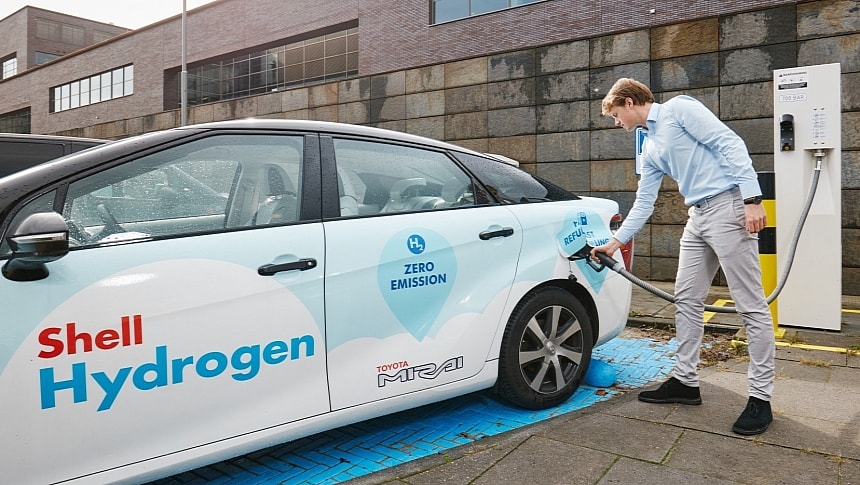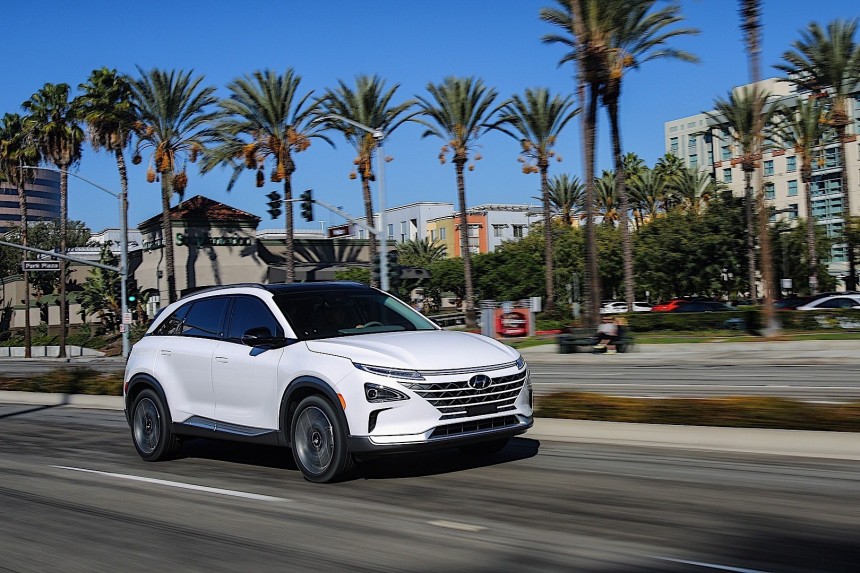Shell decided to permanently close all of its hydrogen refueling stations for passenger cars in California. The oil giant claims that the cause of the move is supply complications.
"Hydrogen fuel-cell cars are the future," analysts claimed, at a time when the EV market was skyrocketing. All that they discharge is water, and refueling lasts only for approximately five minutes.
It sounded like the technology had everything to succeed in a race with the electric cars, which had to spend hours plugged in to add miles to their range. But, over the years, battery packs grew larger, and fast charging technology developed, while the fuel-cell technology was incapable of keeping up.
However, liquefying hydrogen, storing it, and supplying it are expensive procedures that discouraged carmakers from further developing the technology, as well as very low demand and the lack of proper infrastructure for refueling. All the disadvantages created a loop in which potential customers keep their distance from hydrogen-powered cars because there is no infrastructure. And there is no infrastructure because the demand is deficient.
Seven hydrogen refueling stations for passenger cars were operating in California. By closing them down, Shell exited the market for light-duty H2 vehicles in the US, remaining with the three H2 filling stations for heavy-duty vehicles in the state.
The move represents another major blow to the already struggling hydrogen car market in the only state where the fuel was widely available and to the small community of hydrogen-powered cars. This means that the owners of models such as Toyota Mirai FCV, Hyundai Next, and Honda Clarity Fuel Cell owners are going to have to travel more to refill their cars.
Shell had already stopped building additional stations in California, despite original plans to build new sites. Instead, they had temporarily closed five hydrogen stations, explaining that they had no official date set for reopening. It eventually turned out that the closure was permanent.
Only 3,143 hydrogen-powered vehicles were registered in 2023, which equals less than 1 percent of the number of electric cars registered in the same period, according to a report from the California Energy Commission.
Shell Hydrogen Vice President Andrew Beard also refers to "other external factors." Supply disruptions, as well as reliability issues at the stations, have been affecting the owners of hydrogen fuel-cell cars for months.
A report from Hydrogen Insight shows that a court filing indicates that Iwatani Corporation of America (ICA), a Japanese gas company supplying hydrogen equipment and services, was accused of offering equipment that had not been tested in a real-world scenario, hid defects, and misled Shell.
Shell had closed down all three hydrogen stations that it used to operate in the United Kingdom.
Hydrogen-powered vehicles are not more affordable compared to battery electric cars as a way to compensate for the after-sales trouble. The Toyota Mirai starts at $49,500 in the United States. Meanwhile, the Hyundai Nexo Fuel Cell starts at $60,135.
It sounded like the technology had everything to succeed in a race with the electric cars, which had to spend hours plugged in to add miles to their range. But, over the years, battery packs grew larger, and fast charging technology developed, while the fuel-cell technology was incapable of keeping up.
However, liquefying hydrogen, storing it, and supplying it are expensive procedures that discouraged carmakers from further developing the technology, as well as very low demand and the lack of proper infrastructure for refueling. All the disadvantages created a loop in which potential customers keep their distance from hydrogen-powered cars because there is no infrastructure. And there is no infrastructure because the demand is deficient.
Seven hydrogen refueling stations for passenger cars were operating in California. By closing them down, Shell exited the market for light-duty H2 vehicles in the US, remaining with the three H2 filling stations for heavy-duty vehicles in the state.
Shell had already stopped building additional stations in California, despite original plans to build new sites. Instead, they had temporarily closed five hydrogen stations, explaining that they had no official date set for reopening. It eventually turned out that the closure was permanent.
Only 3,143 hydrogen-powered vehicles were registered in 2023, which equals less than 1 percent of the number of electric cars registered in the same period, according to a report from the California Energy Commission.
Shell Hydrogen Vice President Andrew Beard also refers to "other external factors." Supply disruptions, as well as reliability issues at the stations, have been affecting the owners of hydrogen fuel-cell cars for months.
A report from Hydrogen Insight shows that a court filing indicates that Iwatani Corporation of America (ICA), a Japanese gas company supplying hydrogen equipment and services, was accused of offering equipment that had not been tested in a real-world scenario, hid defects, and misled Shell.
Shell had closed down all three hydrogen stations that it used to operate in the United Kingdom.
Hydrogen-powered vehicles are not more affordable compared to battery electric cars as a way to compensate for the after-sales trouble. The Toyota Mirai starts at $49,500 in the United States. Meanwhile, the Hyundai Nexo Fuel Cell starts at $60,135.









